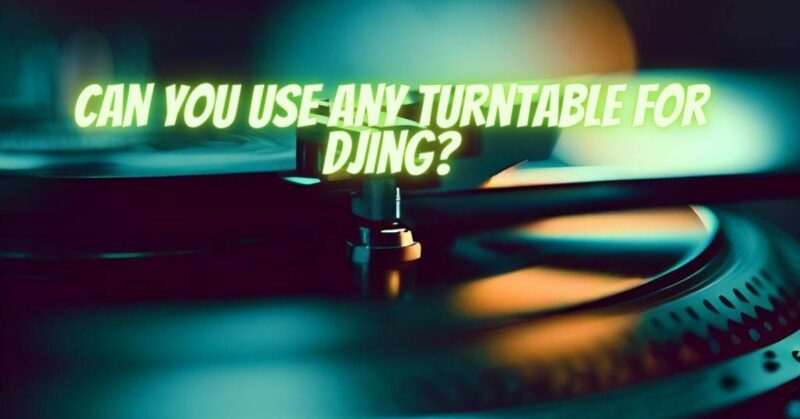DJing is an art that relies on precision, rhythm, and seamless transitions between tracks. The choice of turntable plays a pivotal role in a DJ’s ability to create a dynamic and engaging performance. While it might seem tempting to use any turntable for DJing, there are crucial factors to consider to ensure a smooth and successful experience. In this article, we delve into the question: Can you use any turntable for DJing?
The Essentials of DJ Turntables:
- Direct Drive vs. Belt Drive: DJ turntables predominantly fall into two categories: direct drive and belt drive. Direct drive turntables are the preferred choice for DJs due to their rapid start and stop times, ideal for beatmatching and cueing. Belt drive turntables, on the other hand, lack the necessary torque for precise DJing maneuvers.
- Pitch Control: Pitch control is essential for adjusting the speed of a track to match the tempo of another. DJ-oriented turntables include accurate pitch control sliders to fine-tune the playback speed, enabling seamless mixing.
- Sturdy Construction: The rigors of DJing demand a robust turntable construction to withstand the constant use, cueing, scratching, and mixing. Turntables designed for DJing often have reinforced components and shock-absorbing materials to endure heavy usage.
- High Torque Motor: A high torque motor provides the necessary power for quick start-up and stable rotation speed, ensuring precise mixing and scratching without speed fluctuations.
Considerations for Using Non-DJ Turntables:
- Sound Quality vs. Performance: Turntables designed for audiophile listening might offer superior sound quality but lack the features necessary for DJing, such as pitch control or rapid start-up times.
- Durability and Wear: DJing can be physically demanding on turntables, involving techniques like scratching that put stress on the components. Non-DJ turntables might not be built to withstand this level of wear and tear.
- Playback Speed Consistency: DJing requires consistent playback speed to beatmatch and mix seamlessly. Non-DJ turntables might not provide the speed stability needed for precise mixing.
Modifications and Compromises:
- Upgrades and Modifications: In some cases, it’s possible to modify non-DJ turntables to meet DJing requirements. This might involve adding external pitch control or upgrading components, but these modifications can be complex and costly.
- Temporary Solutions: If you’re considering using a non-DJ turntable for DJing, it might work for basic mixing in a pinch. However, for professional performances or extended DJ sessions, a dedicated DJ turntable is strongly recommended.
The Ideal Choice: Dedicated DJ Turntables:
Using dedicated DJ turntables designed specifically for the demands of the craft is the most reliable and effective choice for aspiring and professional DJs alike. These turntables are purpose-built to provide the necessary features, durability, and performance capabilities required for seamless mixing, scratching, and live performances.
While it might be tempting to repurpose any turntable for DJing, the specialized demands of DJ performances call for dedicated DJ turntables. These turntables are engineered to provide the necessary features, durability, and precision required for successful DJ sets. While non-DJ turntables might offer great sound quality, they often lack the essential tools that make DJing a dynamic and engaging art form. For those serious about pursuing DJing, investing in purpose-built DJ turntables is the best way to ensure a satisfying and seamless experience behind the decks.


